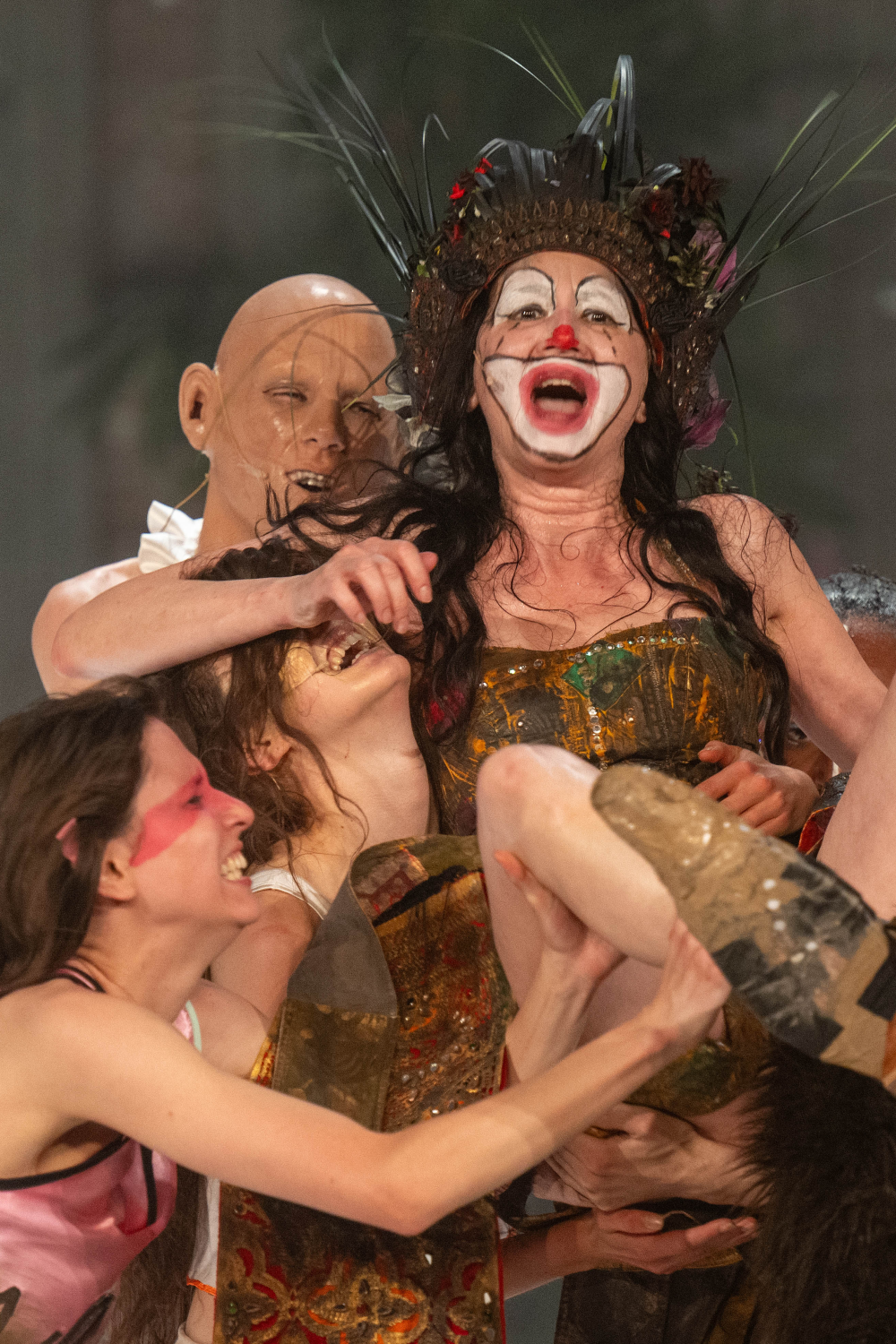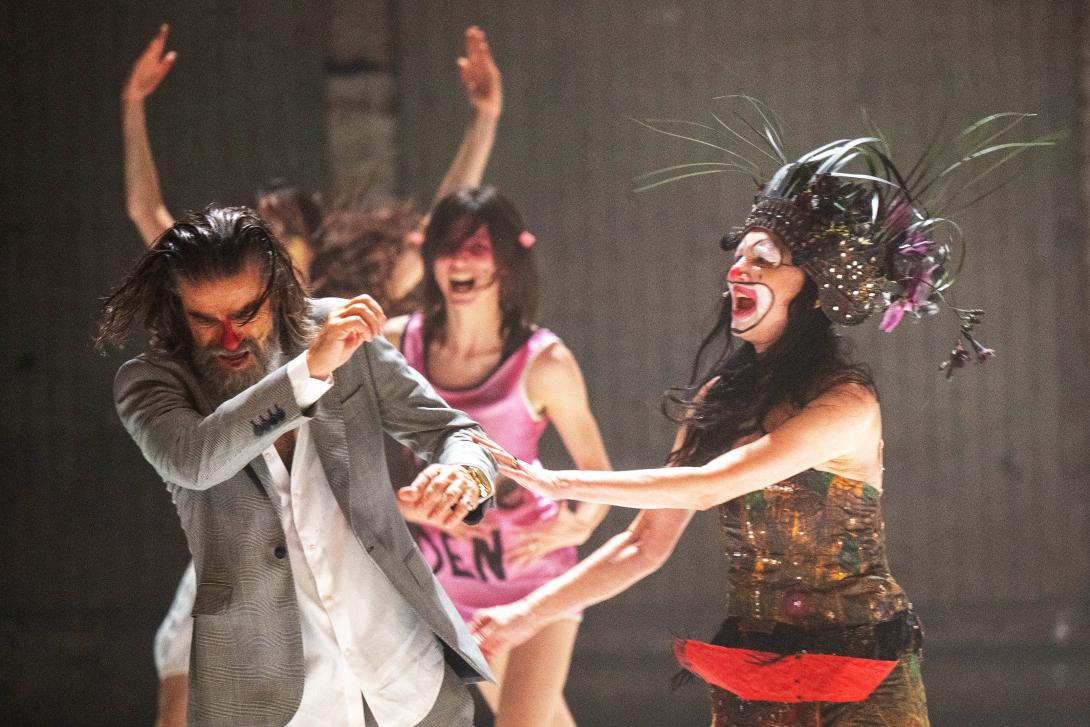A peculiar fairyland where nothing is what it seems
text by Elke Janssens
Let us once lose our oaths to find ourselves,
Or else we lose ourselves to keep our oaths
Berowne, ‘Love’s Labour’s Lost’, ACT 4, SCENE 3
“There is something rotten in Fairyland”, writes Victor Afung Lauwers. Following Billy’s Violence - in which Victor Lauwers boned and abstracted ten Shakespearian tragedies into intimate dialogues between two lovers, he gets to work on the comedies. Billy’s Joy transports us to a peculiar fairyland where nothing is what it seems.
IT IS ALL AN ACT, THEY DO NOT KNOW
The character Fluido kicks off the fairy-tale festivities as a singing stubborn mule. Martha, playing a British actress who wants to shine as Caliban, jumps on the bandwagon and throws herself into her role with great conviction while casually asserting: “It is all an act, they do not know.” ‘They’ alludes to all the others who seem to be imprisoned in this comedy. Romeo gets lost while searching for Juliet, who in turn is transformed into Eden, a contemporary version of Juliet. Oberon and Sycorax imagine themselves to be Romeo’s parents. They are worried and don’t know how to help him. And Pourquoi, the bear, dances roguishly around everyone.
Despite the fact that the start of the performance catapults the viewer into a Shakespearian fairyland, today’s zeitgeist with its ‘major controversies, vulgar polemics, cancel culture, structural racism, climate change and war’ gradually seeps in.
Thus we arrive in a 21st-century stand-alone ‘fluid’ comedy in which - unlike ‘Billy’s Violence’ - the figurative comes to the fore. The frivolity and banality of a baroque excess of citations, references, images and details bring Victor Afung Lauwers’ text to an essential foundation of Shakespeare’s comedies, namely the paradox of ‘losing in order to find’.
Shakespeare’s comedies are a sensory feast in their games and masquerades, with music, dance and a touch of magic. With Billy’s Joy, Victor Afung Lauwers also provides a generous excess, in the coming and going of characters who may or may not refer to Shakespeare. He conjures up fairies, kings and queens, bears and the seven dwarfs and Snow White. Just like A Midsummer Night’s Dream (1595), Billy’s Joy is comprised of several realities (a fairy-tale world, a raw, contemporary dressing room scene, a grotesque play-within-a-play, and so on). You are tossed back and forth between various theatrical realities. Between tragedy and comedy. The question that is not answered with this performance is: are these tragic figures in a comedy or comic figures in a tragedy?
Victor Afung Lauwers argues that the comedies employ a more complex logic than the tragedies: “The key difference between Shakespeare’s tragedies and comedies is that the comedies are not funny. The pages of the comedies comprise a collection of prisms of eroticism, ranging from pastiche to the obscure. One can say that a tragedy is a pornography of human suffering, and that a comedy veils the suffering with human happiness.”
TO THE HEART OF OUR ERA
The majority of Needcompany’s performances go to the heart of their actors. Characters, stories, etc. often link to reality and contain some ambiguity about truth. Isabella’s room (2004), for instance, in which a collection of archaeological objects from the Lauwers family adorned the stage in order to tell a 20th-century tale based on a variety of biographical stories or The blind poet (2015) based on the performers’ family trees or MALAM/NIGHT (2021) which takes Grace Ellen Barkey’s Indonesian colonial history as its starting point. It starts with the truth in order to create a bigger picture or story.
Billy’s Joy goes to the heart, the heart of our era. An era in which privileges and values are being redefined and demand a sharpened awareness. With Billy’s Joy, Victor Afung Lauwers gives the floor to the younger generation, who go in search of their identity. Millennials and Gen Z versus Boomers. Characters mirror or parody figures from Shakespeare’s world.
The figure of Martha is based on various characters: on Caliban (Prospero’s servant from The Tempest), on Nick Bottom (the overconfident weaver from A Midsummer Night’s Dream), on Christopher Sly (a drunken bungler from The Taming of the Shrew) and on Martha Gardner herself as a British actress.
Grace Ellen Barkey’s character Sycorax is equally complex. Her name alludes to Shakespeare’s Sycorax who in ‘The Tempest is simply described as a witch, as the banished mother of Caliban and as a symbol of everything that calls the patriarchy into question. In addition she plays Oberon’s wife, which again links her to the Shakespearian character Titania, Queen of the Fairies. She also plays the mother of Romeo and juxtaposes this with the iconic Needcompany image of the Indonesian princess clown that we know from pieces such as The blind poet and The House of Our Fathers.
This causes the actors to search for their character, their identity and mirrors the contemporary awareness of identity politics. Cultural appropriation is explored by having the black actress Meron playing Snow White. It forces this performance into the straightjacket of the contemporary debate about moral censorship or political correctness. The performance is thus consistent with comedy’s ability to reflect or even to correct, as centuries ago Cicero already described comedy as ‘an imitation of life, a mirror of custom’.
“Some philosopher-kings agreed that it is no longer possible to tell a bigger story, that we, humanity, have lost our values and that our little lives have lost their meaning, that we are tired of not knowing the difference between the beginning, the middle and the end of anything.”
This quote from Fluido alludes to the continually recurring question: which stories need to be told in a world in which we are bombarded with countless stories on a daily basis? What do these stories need to signify? “The narrative has become fluido”, as the character puts it. With Billy’s Joy, Victor Afung Lauwers reaches across Shakespeare’s comedies to arrive at a new contemporary story which sorely tests the spectator: it is a story that literally bursts out of its seams due to the overload of references and allusions to plays by Shakespeare, Brueghelian proverbs, ideologies of Karl Marx and iconic Grimm fairy tales. In addition, the entire performance is interwoven with literal citations from previous Needcompany performances; for example the kitchen from Morning Song, the bear from The Lobster Shop, the princess clown, the hanging of the plumber from Marktplaats 76…
Billy’s Joy evokes a complexity that wants to enforce a freedom to handle text and metatext differently. Jan Lauwers: “The ambiguity and equivocality of the content is underlined by the physicality of the bodies. The actors substantively employ their bodies and thus become supports for the tragedy.” What’s more, Maarten Seghers’s music nudges the narrative into a physical experience. Narrative slips into music and music becomes narrative in which language plays a central role. Thus a synthesis is created between Elizabethan English and contemporary English, which Victor Lauwers himself refers to as ‘Globish’, in which the globalisation process with its ‘grammatical errors’ is completely contained, and whereby the story is told by everyone together.
All of this makes Billy’s Joy an absurd, exuberant celebration in which it entirely conceals its meaning as a mirror, as commentary, beneath a gigantic gaberdine, that beautiful medieval coat, in order to weather the storm of the 21st century

